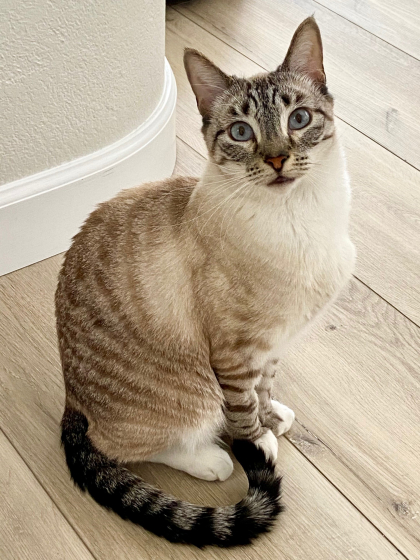Press Releases
Cat with Gingivostomatitis Experiences Relief after Treatment with VetStem Regenerative Cell Therapy
Finn, a Siamese cat, was successfully treated for gingivostomatitis with VetStem Regenerative Cell Therapy at Shadowridge Veterinary Hospital.
2021-12-07 --
Finn, a Siamese cat, was only five months old when he was diagnosed with gingivostomatitis. Gingivostomatitis is a debilitating condition characterized by chronic inflammation of the affected cat’s gums. It can be very painful and lead to inappetence, reduced grooming, and weight loss. Unfortunately, there is no cure for this disease. Common treatments include lifelong medical management with antibiotics, steroids, and pain medications and/or full mouth teeth extractions.
Finn’s owners tried several medications to help his condition, but nothing worked. They did not want to have all of his teeth pulled and were willing to do whatever it took to give him a happy, healthy life. Just shy of his first birthday, Finn was treated with VetStem Cell Therapy.
To begin the VetStem process, Finn’s veterinarian at Shadowridge Veterinary Hospital collected a fat tissue sample from his abdomen in a minimally invasive anesthetic procedure. The fat was aseptically packaged and sent overnight to the VetStem laboratory. Once received, VetStem lab technicians processed the fat to extract and concentrate Finn’s stem and regenerative cells. Approximately 48 hours after the initial fat collection, one injectable dose of Finn’s stem cells was delivered to his veterinarian for intravenous administration.
As a follow up to his initial treatment, Finn received a second intravenous injection approximately four weeks later. Finn had stem cells cryopreserved from his initial fat collection procedure, so no additional tissue harvest was necessary. According to his owners, Finn responded well to the treatment. His owner stated, “[the stem cell treatment] seemed to improve and maintain his condition especially over time so that Finn is happy, healthy, and living a great life. We plan to administer cells every year or so to keep his condition manageable and hopefully keep him healthier too.”
VetStem, a veterinary regenerative medicine company located in California, is currently researching the use of stem cells for the treatment of gingivostomatitis. Current literature supports the notion that gingivostomatitis is an autoimmune disease. Mesenchymal stem cells have demonstrated the ability to migrate to areas of inflammation, down-regulate inflammation, modulate the immune system, stimulate neoangiogenesis (formation of new blood vessels), and repair damaged tissue. Additionally, a recent clinical study demonstrated that intravenous administration of adipose (fat) derived stem cells could ameliorate the clinical signs of gingivostomatitis. While more research is needed, preliminary results suggest that VetStem Cell Therapy can improve the symptoms of some cats with gingivostomatitis.








